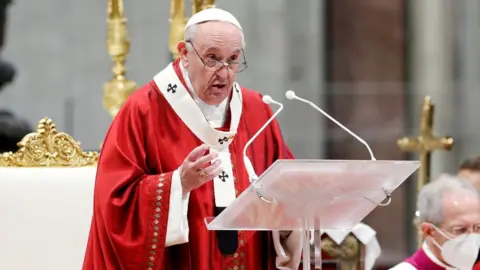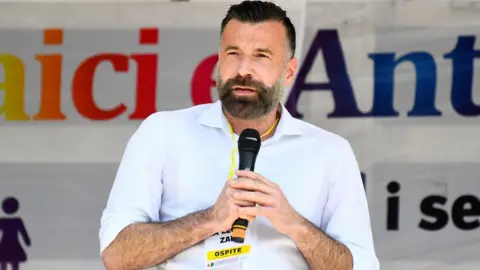Vatican protests against 'unprecedented' Italian bill on homophobia
 Getty Images
Getty ImagesThe Vatican has protested to Italy over a bill on homophobia currently passing through parliament.
The Zan bill would punish discrimination and incitement to violence against the LGBT community, as well as women and people with disabilities.
The Vatican argues the bill would curb religious freedoms secured in a treaty.
Under current Roman Catholic doctrine, gay relationships are referred to as "deviant behaviour".
Advocates of the bill say it has safeguards to ensure religious freedoms.
The Zan bill, named after LGBT activist and politician Alessandro Zan, was passed by the lower house of parliament in November, and now needs to pass the Senate.
It would add legal protections for women and people who are LGBT or disabled. Those found guilty of hate crimes or discrimination against these groups could face up to four years in prison.
What are the Vatican's objections?
The Vatican informally delivered a letter to Italy's ambassador on 17 June, protesting against the proposed law.
Vatican spokesman Matteo Bruni told AFP news agency the bill was "an unprecedented act in the history of relations" between Italy and the Vatican.
The Vatican believes it would violate the Lateran Treaty, signed by the two in 1929, which recognised Vatican City as an independent state.
According to Il Corriere newspaper, the Church has objected to Catholic schools not being exempted from a proposed national day against homophobia and transphobia, to be held on 17 May.
 Reuters
ReutersIt has also expressed concern that Catholics could face legal action for expressing their opinions on LGBT issues.
Matteo Salvini, the leader of far-right Northern League, said his party was aligned with the Church's stance.
Alessandro Zan, who is sponsoring the bill, has rebuffed accusations that it would bring censorship.
"The text [of the law] does not restrict in any way freedom of expression or religious freedom. And it respects the autonomy of all schools," he tweeted.
Since his election in 2013, Pope Francis has adopted a more liberal stance towards homosexuality.
In a documentary last year, he said same-sex couples should be allowed to have "civil unions".
But Pope Francis has previously reiterated the Church's position that homosexuality is a sin. In 2018, he also said that he was "worried" about homosexuality in the clergy, calling it "a serious matter."

